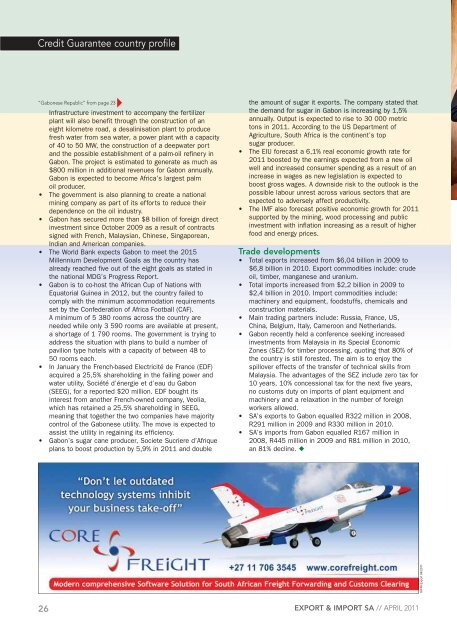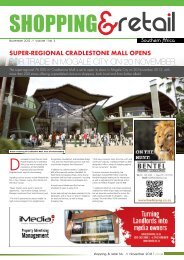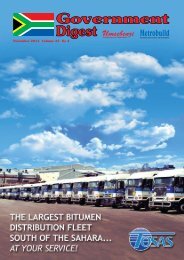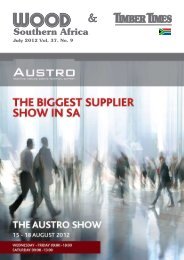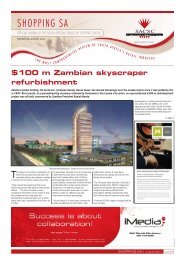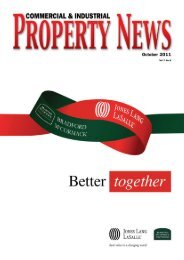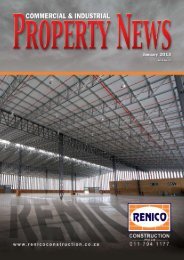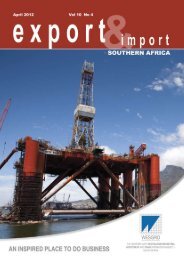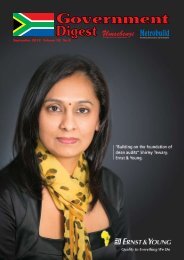April 2011 - Malnor
April 2011 - Malnor
April 2011 - Malnor
Create successful ePaper yourself
Turn your PDF publications into a flip-book with our unique Google optimized e-Paper software.
Credit Guarantee country profile<br />
“Gabonese Republic” from page 23<br />
�<br />
�<br />
�<br />
�<br />
�<br />
�<br />
26<br />
Infrastructure investment to accompany the fertilizer<br />
plant will also benefit through the construction of an<br />
eight kilometre road, a desalinisation plant to produce<br />
fresh water from sea water, a power plant with a capacity<br />
of 40 to 50 MW, the construction of a deepwater port<br />
and the possible establishment of a palm-oil refinery in<br />
Gabon. The project is estimated to generate as much as<br />
$800 million in additional revenues for Gabon annually.<br />
Gabon is expected to become Africa’s largest palm<br />
oil producer.<br />
The government is also planning to create a national<br />
mining company as part of its efforts to reduce their<br />
dependence on the oil industry.<br />
Gabon has secured more than $8 billion of foreign direct<br />
investment since October 2009 as a result of contracts<br />
signed with French, Malaysian, Chinese, Singaporean,<br />
Indian and American companies.<br />
The World Bank expects Gabon to meet the 2015<br />
Millennium Development Goals as the country has<br />
already reached five out of the eight goals as stated in<br />
the national MDG’s Progress Report.<br />
Gabon is to co-host the African Cup of Nations with<br />
Equatorial Guinea in 2012, but the country failed to<br />
comply with the minimum accommodation requirements<br />
set by the Confederation of Africa Football (CAF).<br />
A minimum of 5 380 rooms across the country are<br />
needed while only 3 590 rooms are available at present,<br />
a shortage of 1 790 rooms. The government is trying to<br />
address the situation with plans to build a number of<br />
pavilion type hotels with a capacity of between 48 to<br />
50 rooms each.<br />
In January the French-based Electricité de France (EDF)<br />
acquired a 25,5% shareholding in the failing power and<br />
water utility, Société d’énergie et d’eau du Gabon<br />
(SEEG), for a reported $20 million. EDF bought its<br />
interest from another French-owned company, Veolia,<br />
which has retained a 25,5% shareholding in SEEG,<br />
meaning that together the two companies have majority<br />
control of the Gabonese utility. The move is expected to<br />
assist the utility in regaining its efficiency.<br />
Gabon’s sugar cane producer, Societe Sucriere d’Afrique<br />
plans to boost production by 5,9% in <strong>2011</strong> and double<br />
�<br />
�<br />
the amount of sugar it exports. The company stated that<br />
the demand for sugar in Gabon is increasing by 1,5%<br />
annually. Output is expected to rise to 30 000 metric<br />
tons in <strong>2011</strong>. According to the US Department of<br />
Agriculture, South Africa is the continent’s top<br />
sugar producer.<br />
The EIU forecast a 6,1% real economic growth rate for<br />
<strong>2011</strong> boosted by the earnings expected from a new oil<br />
well and increased consumer spending as a result of an<br />
increase in wages as new legislation is expected to<br />
boost gross wages. A downside risk to the outlook is the<br />
possible labour unrest across various sectors that are<br />
expected to adversely affect productivity.<br />
The IMF also forecast positive economic growth for <strong>2011</strong><br />
supported by the mining, wood processing and public<br />
investment with inflation increasing as a result of higher<br />
food and energy prices.<br />
Trade developments<br />
�<br />
�<br />
�<br />
�<br />
�<br />
�<br />
Total exports increased from $6,04 billion in 2009 to<br />
$6,8 billion in 2010. Export commodities include: crude<br />
oil, timber, manganese and uranium.<br />
Total imports increased from $2,2 billion in 2009 to<br />
$2,4 billion in 2010. Import commodities include:<br />
machinery and equipment, foodstuffs, chemicals and<br />
construction materials.<br />
Main trading partners include: Russia, France, US,<br />
China, Belgium, Italy, Cameroon and Netherlands.<br />
Gabon recently held a conference seeking increased<br />
investments from Malaysia in its Special Economic<br />
Zones (SEZ) for timber processing, quoting that 80% of<br />
the country is still forested. The aim is to enjoy the<br />
spillover effects of the transfer of technical skills from<br />
Malaysia. The advantages of the SEZ include zero tax for<br />
10 years, 10% concessional tax for the next five years,<br />
no customs duty on imports of plant equipment and<br />
machinery and a relaxation in the number of foreign<br />
workers allowed.<br />
SA’s exports to Gabon equalled R322 million in 2008,<br />
R291 million in 2009 and R330 million in 2010.<br />
SA’s imports from Gabon equalled R167 million in<br />
2008, R445 million in 2009 and R81 million in 2010,<br />
an 81% decline. ◆<br />
EXPORT & IMPORT SA // APRIL <strong>2011</strong><br />
18748 Export 04/<strong>2011</strong>


